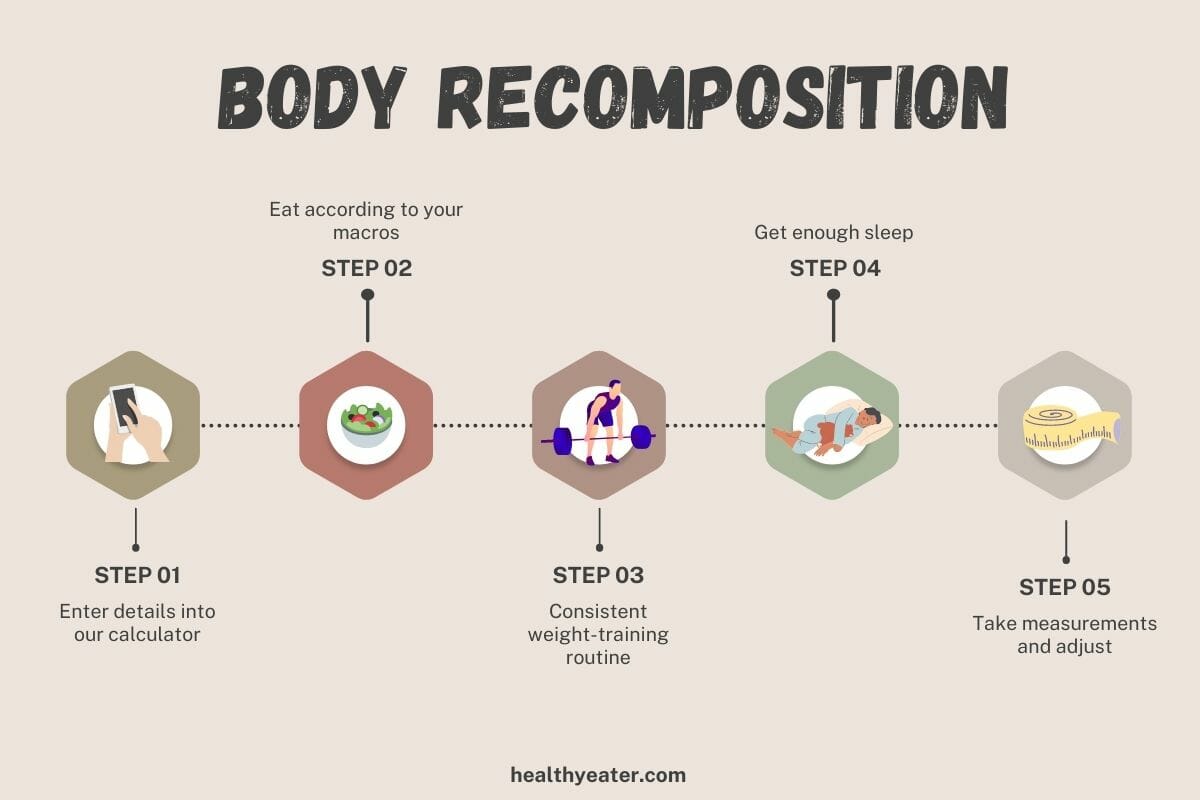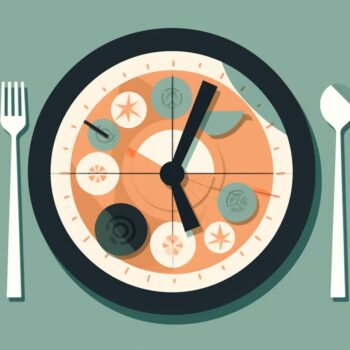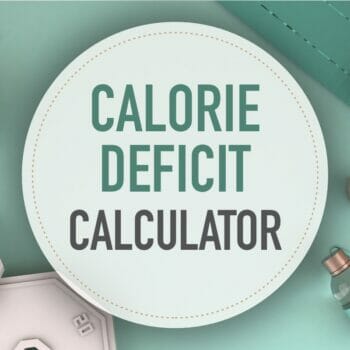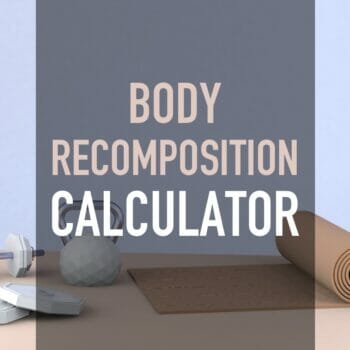Body Recomposition Calculator
Discover the perfect calorie and macro amounts for body recomp with our customizable calculator.
What is body recomposition?
Body recomposition is the process of improving your body composition by increasing muscle mass and decreasing fat simultaneously.
Favorable body composition has many health benefits and improves athletic performance.
There is ample research-backed evidence showing it is entirely achievable. However, it requires a commitment to weight training and a nutrition plan.
How to do a body recomposition
Step 1: Enter your details into the calculator
If you know your body fat percentage (calculate here), choose Lean Mass Formula and input your percentage.
The lean mass method yields better results than weight and height alone.
Step 2: Choose your recomposition goal
- If you choose More Fat Loss, there will be less muscle gain.
- If you choose More Muscle Gain, there will be more muscle gain, but probably some fat gain.
- If you choose Even – it’s a compromise between the two.
Step 3: Take note of your calories and macros
The calculator will recommend your daily calorie and macro amounts. If you’re new to macros, you’ll need to get up to speed.
You will be told how much carb, protein, and fat you must eat daily. You can adjust this to show per meal to help you get an idea.
It’s best to eat more on workout days (the increased carbs fuel your workouts) and less on non-workout days. Protein remains relatively constant throughout – muscle recovery can happen anytime.
Step 4: Stick to a consistent workout routine.
Consistent workouts are not optional for body recomposition.
Your workouts must be resistance-based, not cardio-based. Do weight-bearing exercises rather than running or walking.
As a basis, we recommend this:
- Have three weight training sessions per week.
- Minimum of 30 minutes per session.
- Focus on compound movements.
For example, squats, deadlifts, pull-ups (or lat pull-downs) – rather than bicep curls, etc. - Rest only 30-60 seconds between sets (i.e., leave your phone at home).
- Three sets per exercise, 8-15 reps per set.
Step 5: Track your macros
For the maximum chance of success, you will want to track your macros.
This can be tricky.
If you’ve got the budget, use Factor Meals, which has consistent 500-550 calorie meals. These can form the basis of daily meals, and you can then add in protein shakes to meet the required calorie amount.
Step 6: Get enough sleep
It might seem odd, but let’s quote the research:
Sleep deprivation […] seems to create an “anti” body recomposition environment, where building muscle mass and losing FM [fat mass] would be less likely.
Step 7: Measure results
Rather than using basic scales, use an advanced scale system like Renpho. This gives far more precise body recomp metrics.
How long does it take to recompose your body?

We recommend a minimum of 8 weeks.
Take measurements (fat skinfold tests, photos, etc.) weekly. You can weigh yourself – but that won’t tell you anything about your body composition.
Depending on your results, you will want to adjust your settings.
If you need help, Coach Ted has helped hundreds achieve their goals.
How much protein should I choose?
- The default option (high) is best.
- Maximum is only for those doing longer, more intense weight-lifting workouts.
- Plant-based protein is set lower: It’s challenging to meet the protein macro without carbs and fats getting too high. If you are vegetarian or vegan and okay with 1-2 protein shakes daily, use the default option.
If I do extra workouts, do I need to account for the calories?
You can account for the extra calories if you do over three weight training sessions a week.
- Track your extra calories over a week.
- Be conservative (i.e., don’t overestimate).
- Enter them into the “Additional Weekly Calories.”
The additional energy expenditure will be allocated to the overall weekly algorithm.
If you need help, use the calorie burn calculator. Remember you are looking for extra calories expended over a week.
How many calories should I eat a day for a body recomposition?
There is no one-size-fits-all here. Calories and macros for body recomposition are highly individualized.
Your biological sex, height, weight, and activity level will predict your daily energy expenditure. By making minor adjustments to this, you can begin the process of gaining muscle while losing fat mass.
The technical bits – how to calculate calories for body recomp
- Apply the Mifflin-St Jeor equation to calculate your basal metabolic rate.
- If you know your body fat percentage, use the Katch-Mcardle formula.
- Multiply BMR by 1.2 to get your maintenance calories.
- Adjust the calorie amount for training days based on the goal:
+20 % for more muscle gain and +10% for more fat loss. - Adjust calorie amount for rest days based on the goal:
-5% for more muscle gain, -15% for more fat loss. - Calculate protein amount
The default is 0.95 grams protein/lb (~2 g / kg) of body weight. Plant-based is 0.65 g/lb. - Calculate the fat amount.
Calculate fat at 30% of daily calories. - Calculate the carb amount.
All remaining calories are allocated to carbs.
Yes 🤓. That’s why we made a calculator.
Is this the same as the macro calculator?
No, there are many differences.
The standard macro calculator is aimed at people wanting to lose weight, and exercise is optional.
There are differences in both the calorie calculation step and the macro calculation step.
How much cardio for a body recomposition?
The traditional bodybuilding method involves a ‘bulk’ phase (lots of calories + heavy weights), followed by a ‘cutting’ phase (reduced calories + lots of cardio).
Body recomposition is a different process. Cardio alone (such as steady-state running or walking for 20 mins+) won’t increase muscle mass.
You should keep cardio to a minimum. However, it’s good for the heart and mental health, so don’t give up going for bike rides or walks if this is your thing.
It’s a good idea to account for the extra energy expenditure from cardio.
If you burn a lot of calories through cardio, you will not achieve the desired body recomp results. You are not doing a body recomposition!
Help! I’m not getting the desired results
- “I’m gaining some muscle but not losing fat“
Adjust calories down lower. - If your goal is Even, change it to More Fat Loss.
- Are you eating more on workout days? And less on non-workout days?
Sources
- Barakat, C., Pearson, J., Escalante, G., Campbell, B., & De Souza, E. O. (2020). Body recomposition: can trained individuals build muscle and lose fat at the same time?. Strength & Conditioning Journal, 42(5), 7-21. (full text)
- Ribeiro, A. S., Pereira, L. C., Schoenfeld, B. J., Nunes, J. P., Kassiano, W., Nabuco, H. C., ... & Cyrino, E. S. (2022). Moderate and Higher Protein Intakes Promote Superior Body Recomposition in Older Women Performing Resistance Training. Medicine and science in sports and exercise.Link
295 Comments


 Menopause Macro Calculator
Menopause Macro Calculator Intermittent Fasting Calculator
Intermittent Fasting Calculator BMI Calculator
BMI Calculator Calorie Deficit Calculator
Calorie Deficit Calculator Body Recomposition Calculator
Body Recomposition Calculator
Hi ted
my goals is body recomposition 153cm 72.8kg female my lower body muscles are low and upper body are normal I don’t know if I should stay with body recomposition or do the bulking and cutting also i walk 10 k steps plus weight lifting 6 times a week is the 10k steps effect my recomposition
Hi! It’s all about the right nutrition as well as the right weight lifting progression for your lower body and I definitely think you should avoid bulking and cutting cycles, which are hard on the body. Also make sure you are giving muscle groups adequate time for recovery/rebuild. The older you are the more time is needed. Happy to evaluate and calculate everything with the custom option.